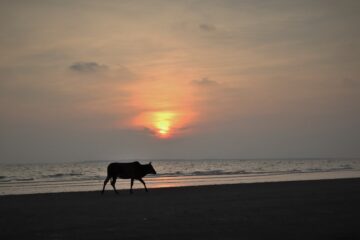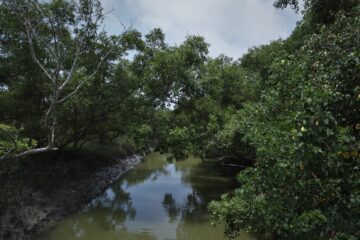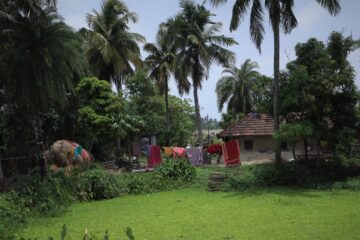The fishing villages of East India, Bakkhali.
India is a peninsula country with an enormous coastline shared by the many culturally diverse territorial states in the country. Every state celebrates their coast in their own unique way, some keep it simple and traditional while some attract a more modern vibe to coastal leisure.
India’s coast on the Bay of Bengal isn’t new to the world, as the port of “Calcutta” was an important center for world trade and commerce during the times of the British East India Company. Today the port still remains a busy and important east Indian port but our experience isn’t about trade and commerce, our experience takes us to across a more simplistic charisma that presents a land comfortable to sustain and survives only on the means necessary.
Scattered adjacent to a complex network of riverine and tidal waterways and on the fringes of the world’s largest delta and mangrove ecoregions of the Sundarbans are the remote fishing villages of Bengal. While the UNESCO World Heritage reserve of the Sundarbans attracts nature and wildlife scholars and enthusiasts from around the world to its protected boundaries, it is culture, tradition and respect given to the forest by the native village people surrounding it who share its true deliverance.
Our journey takes us to the island of Bakkhali in the Sundarbans where the paved road ends and where an infinite marine horizon limits your straining sight presenting a new experience across a sandy shore.
The neat black tar road beautifully lined with coconut and banana plantations leads us to the town where comfortable accommodation and dining establishments have gradually become more presentable and attractive, however they will only be utilized to comfort tender feet after a good day of exploration around this fascinatingly remote island.
Bakkhali is indeed a fishing town with traditional village huts built along every tidal channel and creek entering the island. Anchored and docked for loading, unloading and maintenance historically shaped dhow boats line each channel with their stunning resemblance to a scene taken from Shakespeare’s “Merchant of Venice”. Travelers who happen to catch a trawler entering port may have the opportunity of buying fresh catch straight off the boat. Fish, crab or Shrimp in all sizes bought off the boats can be handed over to any one of the many traditional shacks on the beach that would prepare it as per your preference while you sit back, relax and permit the rolling waves to tick your leisure clock.
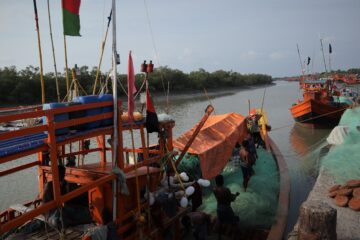
Fishermen prepare for voyage.
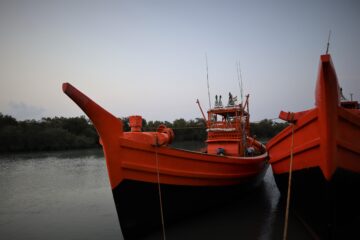
New Dhows join the fleet.
As you explore along the mangrove forests and remote traditional huts you will discover endless white sand beaches hosting nothing but just you or sometimes cattle for company with the sound of the tide moving in. So before setting out it is advised to stock up on hydration and nibbles to extend your serenity in the solace of coastal bliss. The beach is tidal and flat that recedes around mid-day revealing a diversity of tiny sea species that experienced Plover (Charadrius alexandrinus) birds call lunch. The islands species of Red Ghost Crab (ocypode-macrocera) who in large numbers climb out of their burrows to work on their tan and in doing so form a red carpet like layer, inspiring the illusion of a red sanded beach.
With some of the best Sunrises and Sunsets a lens could capture from various points across the island, it is the interactions with the locals that captures the heart, people who adore their native environment. After countless cups of tea and fried fish flavored in rich traditional spices our conversation with the locals ascended with cultural enlightenment as the colors of the setting sun transitioned elegantly towards a darker hue.
Interestingly our conversation revealed that apart from its dependence on fishing Bakkhali depends on the influx of weekender tourist from nearby Kolkata. These visitors flock to its shores in groups for the weekend where business picks up on a Friday evening and diminishes by Sunday brunch. It is a busy time for the locals who work relentlessly to cope with the rapid demand. Due to it being just a weekend hype small business do not resort to hiring extended manpower and generally prefer to work as a couple with the occasional helping hand of a relative. It is also not the best time to catch up on local folklore as they are just too busy. A weekday perhaps is where you have all the attention and can really catch up on the tales of the land.
Another interesting conversation with a sailor who worked on fishing trawlers for a large chunk of his life shared his experience of what it was like sailing the high seas without modern navigational aid and bamboos for lifebuoys. Bamboos that once kept him afloat and adrift for hours before finally being rescued by a fishing boat near the coast of Thailand. However, it wasn’t just nerves of steel that made them dare, legend has it, that the Goddess of the Sundarbans “Bonbibi” or “lady of the forests” has guided sailors lost at sea and protected them from being killed and eaten by tigers and other wild animals when their boats had run aground in the dense forests of the Sundarbans. Since then, we learned that every fishing village in the region has a shrine dedicated to Bonbibi which is visited by sailors and given offerings in exchange for her blessings and protection before heading out on a voyage.
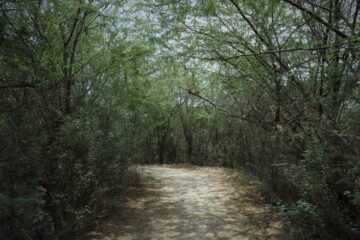
The mangrove path.
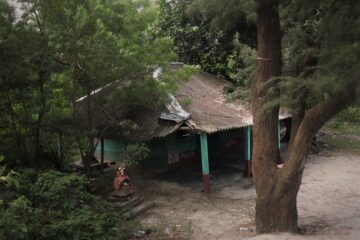
Bonbibi Shrine, inside the forest.
Rural India follows an “early to bed early to rise”, module which is a naturally splendid daylight-saving practice for travelers who aim to leave no stone unturned and just explore. The island has many options for an all-day island exploration followed by an all-day boat excursion which is another thrill where visitors can explore the open waters surrounding the Sundarbans National Park offering a much more relaxed experience excellent for birding, and finally a day of leisure to rest your exploring soul and surrender to the elements of nature.
The Sundarbans and its surrounding villages are some of the worlds most fascinating regions. A world heritage eco-region, a rich and thriving biodiversity of flora and fauna, pristine coastal landscape with culturally pleasing natives that together welcome a world of travelers. Travelers who respect and contribute to preservation and sustainability in a destination that survives only on means that are necessary.
